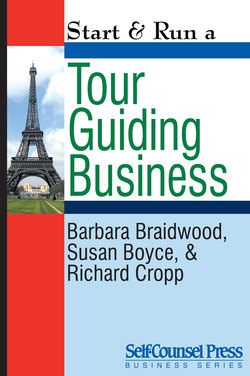Читать книгу Start & Run a Tour Guiding Business - Barbara Braidwood Susan Boyce & Richard Cropp - Страница 65
На сайте Литреса книга снята с продажи.
4. Keep People Informed About All Activities
ОглавлениеNext to providing commentary, this is one of the most important duties a tour professional has. While it becomes more important as the length of the tour increases, making sure everyone knows exactly what is happening and what is expected of them during the next few hours is just as important as announcing tonight’s dress code for dinner or reminding people to have passports and travel visas handy for tomorrow’s shopping trip across the border into Tijuana. For instance, there will be times when you must be away from the group for short periods. Always indicate when you expect to be back, since some people become nervous if they haven’t seen the tour director for a quarter of an hour.
Be specific. If you have ever waited for an unpleasant task to end, you will know that “We’ll be at our hotel soon” means very different things to different individuals. One person may assume you will arrive in an hour or so, while another will expect to be in the front lobby within five minutes. “We’ll be at our hotel at 5:30” is clear to everyone. Likewise, “The gray high rise with the statue in front, which you can see to your right” may sound like overkill but is far easier to understand than “The tall building over there.” Just where is “over there” anyway? If possible, a written daily itinerary helps avoid such misunderstandings as “But it’s only 9:15. Didn’t you say breakfast started at 9:30?” Post a notice beside the elevator or in some other prominent location, and then give everyone verbal reminders several times throughout the day.
The key to passing on information effectively is to give it to the entire group as a whole. This saves you time because you don’t have to repeat yourself, ensures no one misses a crucial set of instructions, and avoids giving the impression of any form of favoritism. Never assume everyone can hear you, even if you are all crammed into a small waiting area or lobby. Always ask, “Can everyone hear me?” Many people, seniors especially, are hard of hearing but hate to admit to it. Here are some of the obvious and not-so-obvious details that your clients will want to know about, even if they haven’t yet thought to ask you.
• What time is lunch and what restaurant will it be at?
• When should I get my wake-up call and how do I get one?
• Should I put my bags in the hallway or will the bellhop (or room steward) get them from my room?
• What time does the bus leave tomorrow morning?
• Is there a washroom at the next stop? How far away is it?
• How much time will I get to spend in the air museum we are visiting today? Will we be going through on our own or will the curator be with us so I can ask questions?
• I’ve run out of money. Where can I cash a traveler’s check and know I am not getting ripped off? (Sometimes hotels offer better rates than banks. If you can find out the current exchange rate, you will impress your group even more.)
• Help, I’m suffering from shopping withdrawal. Where’s the nearest mall?
• I’m really bored. I have no idea what to do with my free day. Can I rent a bike around here?
• My room is on the top floor. Where are the elevators?
• I want to have lunch at the beach. Will the hotel make me a picnic basket?
